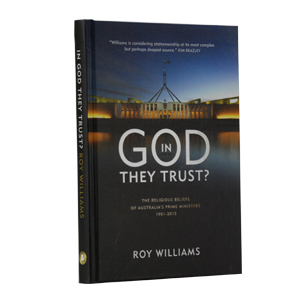Australian Christian intellectual, Roy Williams, has written a game-changing book on leadership. In God They Trust? is a unique, in-depth study of 23 Australian Prime Ministers from 1901-2013. It focuses on one element of leadership: religious convictions. Williams has uncovered the influence of religion on the decision-making processes of those we have elected to govern the nation. Perhaps surprisingly, he concludes that for all but a handful of PMs, religion plays a role in their approach to leadership.
Christians will have different views regarding which aspect of leadership matters most. Is it moral fortitude? Is it compassionate vision? Is it the courage of conviction? Or something else? If Roy Williams is correct, the leadership priorities of our Prime Ministers are informed by their deepest beliefs about God, human nature, and the concept of final judgement. As Kim Beazley, current Ambassador to the USA, writes in his splendid foreword to In God They Trust?
“Unless a Prime minister has actively rejected the notion of a deity and views their social responsibilities in a humanist context, they like their fellow Australians will retain in a corner of their minds the possibility of a spiritual source of help and possibly a broader point of accounting than an electorate.” (p. 13)
What does this mean for the Christian voter? In my view, it is good news. It means that in our deliberations on who will be our best leaders, we are able to identify the spiritual wells from which they are drawing. It gives a greater sense of their character, their history, and the forces applying pressure to the decisions they make. In the cases of Kevin Rudd and Tony Abbott, we have plenty of material on their religious beliefs to consider, including the chapter on Rudd in Roy Williams’s book.
It also means that we, as the voting public, can keep calling our leaders to attend to their highest convictions, to remember that “there is no authority except from God, and those that exist have been instituted by God” (Romans 13:1). If most of them already have an inkling of this, no matter how faint, it is an appropriate call for us to make. And the quality of our political discourse will be all the better for it.
Just as importantly, Roy William’s book puts to death the notion that religion and politics don’t mix. It is quite obvious, historically and morally, that they do and have for the majority of Australia’s Prime Ministers. The Christian faith has shaped this nation more than any other worldview, and continues to do so. This fact must not be lost as we consider what kind of nation we want to be, and the degree to which religious convictions have brought us the many social goods that we enjoy today. In the face of rising secularism, and the problems associated with religion in the public square, there is a very appropriate conversation to be had about what Kim Beazley again describes as “the most complex but perhaps deepest” source of statesmanship.
In God They Trust? is widely available in secular and Christian bookshops and at Bible Society’s online bookstore, here.
Email This Story
Why not send this to a friend?

